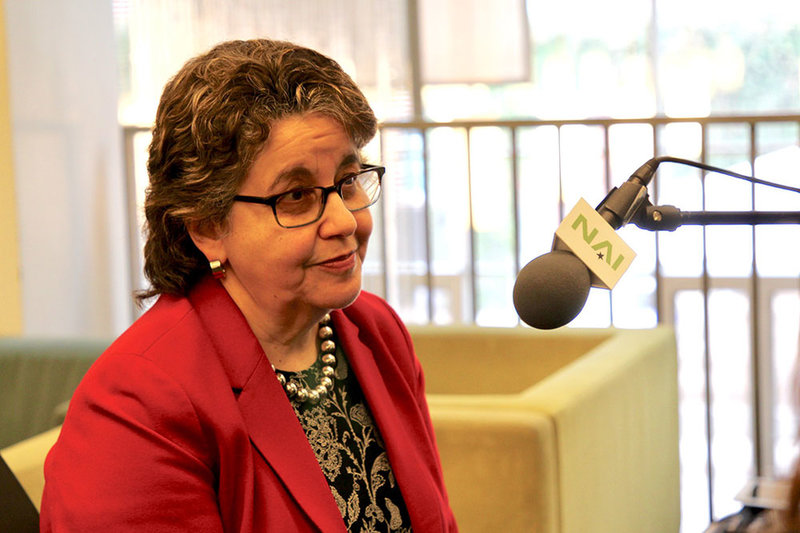Politics and Policy
Ellen Weintraub:
“I'm Very Concerned About How the Election Will Be Run”
The US presidential election comes at a time when there are serious concerns over the state of politics, particularly when it comes to the involvement of technology. Lucy Ingham hears from Ellen Weintraub, commissioner on the US Federal Election Commission, about the biggest concerns and potential solutions

There are few times when being a commission on the US Federal Election Commission (FEC) is an easy role, but 2020 must be surely one of the most challenging to date. For Ellen Weintraub, who has been on the FEC for 18 years and chaired it three times, the current challenges are significant.
“I'm very concerned about how the election will be run, whether it will be accessible and safe for all the voters,” she says, speaking at a press conference at Collision from Home.
Key to this concern is the issue of access to mail-in ballots given the Covid-19 pandemic, but there are also other, longer-standing concerns.
“I maintain my concern over the issues that I used to care about way back when before the pandemic struck. Issues like the role of dark money in our politics: [in the past 10 years], we've seen a billion dollars in dark money that is spent in our elections, and we don't know where it's coming from,” she explains.
“And the other big concern that I have had and continue to have is whether there will be foreign interference in our elections. Our intelligence community has warned us that this will happen and did happened in 2016: it's likely happening now.”
However, while these are deep concerns, Weintraub’s focus is on money in politics, and in particular how it is spent.
“At the FEC, we regulate money in politics. We have an unusual structure here in the United States where there is no central election commission that runs the elections. That all happens at the state and local level,” she says.
“We are in charge of money in politics, making sure that it's transparent and making sure that the voters know who's supporting the candidates and where the information is coming from when they see advertising on TV or newspapers, or increasingly in the digital medium.”

Ellen Weintraub, commissioner on the US Federal Election Commission. Image courtesy of IVN.us, IVN News
The perils of micro-targeted political advertising
Digital advertising is, to the surprise of no one, very much on the rise. It’s thought that for the 2020 US presidential election, spending on digital advertising will be three times that of the 2016 election, with CBS estimating a spend of around $1.3bn.
However, there is more than one way to advertise in the online space, and for politics, some variants raise considerable problems, most notably micro-targeting.
“I've asked the platforms to step in and limit micro-targeting of ads. As you may know, Twitter has banned political advertising – that may be a step too far; I don't like to see platforms shut down for political speech – Google has implemented some restrictions and Facebook has decided they're not going to have any restrictions on micro-targeting,” she says.
This is an issue for Weintraub, she says, because they play into “polarisation, divisiveness and the spread of disinformation in in our election”.
“When these ads are so micro-targeted, it does not allow for the possibility of counter arguments.”
“These micro-targeted ads allow people to hone-in based on the vast store of data that Facebook and other platforms are collecting about all of us users. And to target the ads very precisely so that the ads that you see are different from the ads that your neighbour sees, and possibly different from the ads of the person across the dinner table from you,” she explains.
She argues that is a particular problem now when many of us are interacting far less with others than we would normally, and so are missing out on the “opportunity for casual conversation where we can talk about what we've heard and what we've been reading about the election”.
“When these ads are so micro-targeted, it does not allow for the possibility of counter arguments. That is what our First Amendment celebrates, that if somebody wants to make an argument, they should be able to make their argument and then you should be able to come in and counter it with a another argument that refutes it, if you think there's a better argument that they ought to hear,” she says.
“But when everybody's in their own little information silos, and you're not hearing the same arguments, there is no opportunity for that kind of counter speech, which I think really defeats the exact way that our First Amendment is supposed to protect the kind of wide-open, robust debate that we all want to see in our elections.”
Alternative approaches to online political advertising
While Weintraub is against micro-targeting, she recognises the need to have political advertising in the digital space, which begs the question: what is the right way to serve political ads?
“Google may be the closest although they're also keeping it to a relatively small group,” she says.
“They've come up with a policy that they won't micro target, look below the level of zip code, age and gender. So the typical zip code has about 8,000 people, if you start segmenting that by age and gender that's still getting to a relatively small group.”
“The key is to have enough eyes on the information that if there is misinformation or misleading information, then there's an opportunity for people to correct the record.”
For Weintraub, this isn’t ideal, but it is closer than micro-targeting to the level she believes is appropriate.
“My proposal was more on the level of a congressional district for national advertising, although if you're running in a smaller race then it'd be fine to go down down one civic level in terms of the advertising,” she says.
“But the key is to have enough eyes on the information that if there is misinformation or misleading information, then there's an opportunity for people to correct the record; for people to come forward and get other kinds of information out there.
“We’ve got to make sure that we have a broad enough audience for it, not with the goal of restricting speech, but rather with broadening who gets to hear the speech so that we get a better debate.”

Combatting misinformation
The issue of misinformation in elections, of course, reaches far wider than just political advertising, and Weintraub expresses deep concern about the potential impacts.
“I'm worried that people will lose faith in the strength of our democracy and in the outcome of the election. I am concerned, then, at this time of great polarisation,” she says, pointing to the inaccurate claims that a rise in mail-in ballots will cause an increase in voter fraud.
“It's very easy for people to fall back into their own information silos and think well, everybody that I know is voting for the candidate that I like, so if the other guy wins, it must be because of fraud. It must be because there's some malfeasance going on,” she explains.
“Phishing attacks targeting people’s concern about the pandemic have been rampant with a significant uptick in abuse of less technically savvy users.”
“And when you lose faith in the conduct of your own elections, that's very hard to rebuild, which is why I think it is so important to punch back at the kinds of conspiracy theories that are out there.”
On voter fraud, she highlights that the idea of committing fraud via mail-in votes is deeply illogical.
“People have done a lot of studies on voter fraud in the vote-by-mail context, as well as in the in-person context, and they have found that it is really infinitesimal. It doesn't make a lot of sense for anybody to commit this kind of a crime,” she says.
“It is a crime, people can go to jail for it, they can be fined for it, and usually it involves changing one vote. If you go and you steal somebody's ballot, you've managed to change one vote and you risk going to jail for that.
“Plus the administrators of the elections: they're on to this. They've got techniques for tracking ballots, and they do signature matches, and they make sure that the ballots are going to the right places and coming from the right people. So there are a lot of checks and balances in place.”
The role of Big Tech
Given how much of this misinformation is spread on the platforms of major technology companies, their role is clearly important, and Weintraub says that the FEC “should engage with tech companies”.
“I've tried to engage with some of the tech companies, I think they ought to be involved,” she says, adding that getting them to engage can be a challenge.
“Last time we did a rulemaking with a technological aspect to it I, I specifically reached out to Facebook, Twitter and Google and a number of the platforms out there and invited them to come in and testify,” she says.
“Tech companies say they would like to have some guidance, but they're not really pushing for regulation.”
“They submitted written comments, they decided they didn't want to come in and testify in person. That was little bit disappointing – I would like to have their feedback.”
She argues that the platforms are engaging in what she calls “a bit of a two-step”.
“They say they would like to have some guidance, but they're not really pushing for regulation,” she explains.
“They really want to make their own decisions and they're in a position where they have great, great power.”
As a result, she argues that permitting such platforms to merely self-regulate is “probably not the best place to draw the line”.
“I think there should be some government regulation. It's been hard to craft regulations at the FEC, and Congress has not been able to pass legislation either. And the tech companies are playing a larger and larger role in in all of our conversations, but particularly about politics.”
Back to top